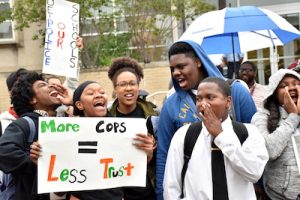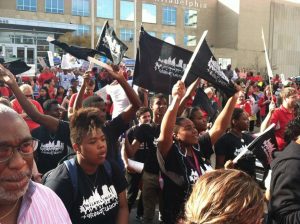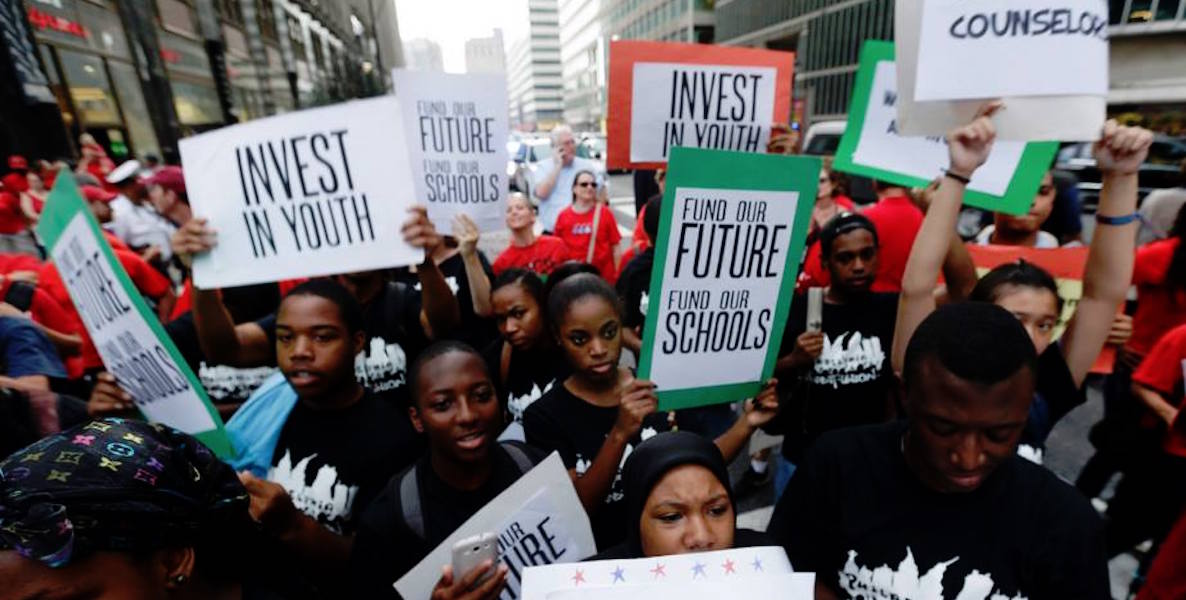The video is only 13 seconds long, but it speaks volumes about what goes on in Philadelphia high schools. In it Brian Burney, a Benjamin Franklin High School student, is on the floor, with a school police officer on top of him, restraining him from behind. A voice on the film urges the officer to let up: “He’s not even resisting, let him go, he’s not even resisting…”
Uploaded to Vimeo shortly after the May 5 incident, the video has been viewed nearly 16,000 times, by people all around the country—reminiscent of the video from South Carolina of a girl being tackled to the ground by a school cop last fall. The incident has pitted students at public high schools in Philly against the policies of those schools: Locked bathrooms that students need passes to use; the presence of school police officers who, according to a recent state Auditor General report, are often not properly trained or subjected to the proper background checks; the suspension or expulsion of black students at 3.5 times the rate of white students, which studies show makes them more likely to end up in jail.
Student witnesses have said Brian was put in a chokehold, and suffered a concussion. The District has disputed that characterization, but has transferred Officer Jeffrey Maciocha while it investigates the incident.
In another school, at another time, the whole episode might have gone unnoticed, like so many do. But Brian is a member of the Philadelphia Student Union, a 20-year old citywide student activist group. PSU organized protests outside the School District, and has launched a social media campaign that has pushed school policing to the forefront of our city’s—and nation’s—attention.
“We’re looking for leaders,” says Rivera. “We ask them, ‘When people are going to make decisions about your education, do you want your voice to be heard?’ Young people are not recognized as leaders in this city and are the most missing from the conversation.”
“The Philadelphia Student Union challenges us to see this one act of violence in the context of a much broader, sustained attack on black and brown bodies, on public education and on youths’ rights,” Villanova professors Jerusha Conner and Kelly Welch wrote in US News in May. Or as PSU executive director Hiram Rivera puts it, “Brian’s assault is just one of many assaults that happen every day. It’s like the wild west of police.”
The incident with Brian, a vocal PSU member, has galvanized the group around an issue they say they face every day in schools. On a recent afternoon, several students in their brand new office just off Malcolm X Park in West Philadelphia, were making signs—with slogans like “We are students, not criminals”—for an upcoming vigil in honor of Brian. “There have been a lot of these problems at our school,” says Aigner, a sophomore at Franklin. “The [policing] has to stop. I would never want my brother treated that way.”
Started in 1995, PSU is one of the earliest student unions, and has become a model for a nationwide movement among urban students—including those in Newark and Chicago—to organize for safe and high-quality education in their districts. Masterman grad Eric Braxton and a group of fellow Masterman students began the group after recognizing the problems their school faced because of underfunding, and realizing that neighborhood schools were struggling even more. At first, they wanted to start a youth advisory board to the Board of Education, but when that didn’t happen, the project took a new turn.
“We decided that we wanted something that would not just give voice to a few students, but would empower all students in Philadelphia,” wrote Braxton in an article for PSU’s 20th Anniversary newsletter. The White Dog Cafe on Penn’s Campus agreed to let them meet there and gave them initial support to get off the ground. In 1996, the group helped organize a citywide walkout in the wake of major education budget cuts. “As thousands of students streamed to City Hall from every part of the city, we knew something special was starting.”

Since that time, the PSU has launched campaigns for changes on a wide variety of school issues, including: school underfunding, which has left Philly students without counselors, nurses, or after school programs; pushing back against the increase in charter schools; fighting for funding at the state level; pushing for the SRC members to be elected rather than appointed so they are accountable to students and parents; school policing; and ending the school-to-prison pipeline by changing the “over-reliance on exclusionary discipline practices (like suspensions and expulsions)” in favor of prevention measures like restorative practices.
PSU membership is open to all high school aged young people in Philadelphia, and over its lifespan has had chapters at 15 schools, where each week students participate in leadership workshops, get involved with citywide campaigns and plan school-based campaigns and activities. There are also weekly citywide meetings for students who attend schools without a chapter, with other workshops, and where they can socialize with activists from around the city. All PSU programs are free, and food and tokens are provided at all meetings. Many members take to calling the PSU “a family.” The organization and its staff are funded primarily by foundations, but also receive grants from local, regional and national funders as well as individual contributions.
“PSU does not give students their voice,” says PSU alum Deborah Dowlin. “It shows young people how to use the voice they were born to use.”
Students join the PSU through many different channels, including needing help when an issue arises at their school, word of mouth, social media, and the on the ground outreach that PSU staff organizers do on the first day of school around the city and routinely throughout the year.
Representatives of PSU working on campaigns regularly meet with people in power like the mayor and Superintendent Bill Hite, and testify at School District and City Council hearings. They speak at rallies, lead marches and walkouts, speak at press conferences, and create their own newsletter, short films, and news podcast. PSU’s five staff members offer training in public speaking and media making, but the students are the ones calling the shots and appearing in the spotlight.
Started in 1995, PSU is one of the earliest student unions, and has become a model for a nationwide movement among urban students—including those in Newark and Chicago—to organize for safe and high-quality education in their districts.
“We’re looking for leaders,” says Rivera, who estimates PSU has 150 core members (though many more students are involved in rallies, protests, workshops, and events). “We ask them, ‘When people are going to make decisions about your education, do you want your voice to be heard?’ Young people are not recognized as leaders in this city and are the most missing from the conversation.”
The PSU claims many victories over the years. At Overbrook High School, chapter members won the end to a punitive late room policy. At Sayre High School, students fought to have their school police officers trained, and students at West Philadelphia High School advocated for and received restorative practices as alternatives to suspensions and expulsions. In 2011, the Furness High School chapter successfully organized to help prevent the closing of their schools.

“Most youth organizations don’t survive 20 years,” says Rivera. “We have, because of the tremendous support we’ve had locally and nationally.” (Just last month at the protest for Brian Burney, PSU members were joined by students and organizers from Chicago.) “And also because we’ve never compromised our values or shied away from taking the necessary risks to make sure justice is served. We’ve never stopped trusting in the power of young people.”
Over 3,500 young people have been members of the Student Union over the years, and thus gone through the PSU’s leadership development program. Many former members have become active in organizing, civic engagement, and advocacy in their colleges and communities and current members are involved a wide range of initiatives in their neighborhoods, beyond just schools. “If it were not for the Philly Student Union I would not be the person I am today,” wrote Ben Shapiro, a PSU alum in their newsletter. “I have been actively working toward changing the world we live in ever since high school [because of] the experience I had with the PSU and the political education I received there.”
Sierra, a senior at Benjamin Franklin High, who has been involved with PSU for three years, says her motivation is simple: “I help so that future students won’t have to go through what we’ve gone through.”
Photo header: Courtesy of Philadelphia Student Union


